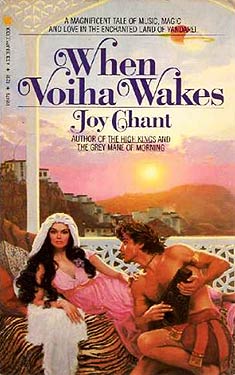Joy Chant
Completed 1/17/2022, Reviewed 1/17/2022
3 stars
This was an interesting read. I had a lot of trouble getting into it. In the middle, I kind of finally got into the main plot. Then I loved the last forty pages. This is a short book, only 160 pages, and it takes most of it to the get the punch it packs. It’s basically a love story in a world where men are only meant for the crafts (pottery, carpentry, etc.) and women do everything else including govern. Most importantly, music is not valued, and is not seen as a viable craft for a man. It’s set in the same world as Red Moon and Black Mountain, but it is a self-contained story. It won the 1984 Mythopoeic Award. I don’t believe it was so good to win an award, but there are no other nominees listed for that year. I checked the Mythopoeic Society’s website and for 1984, it says that the other nominees are not available. I would have liked to have seen who else was considered that year.
The story is about Rahike, confidante of the Queen and Younger Mistress of the small city in which she lives. She finds a lover in Mairilek, a potter apprentice who is not good at his craft. Before they were lovers, he gave her money to buy him a musical instrument when she went on one of her travels. She brought him back one which he learned to play. When they connected, he played music for her which moved her immensely, but was complicated, and she didn’t understand it. She became the subject of gossip, fostering music in a city where music is not appreciated and not seen as a viable craft for a man. So she must choose: keep him here where his soul may starve as a general laborer since he’s a terrible potter, or let him leave for where he can become the music master that she knows he is.
The story raises interesting points about identity, music in society, gender roles, and fear of change. Chant weaves them into the story nicely, not really bashing you in the face with them. I liked how she played with gender roles. Women wore pants while men wore kilts. The objectified men wore jewelry, flowers, and kept themselves shaven to look boyish. At one point, Mairilek asks Rahike if she would have loved him if he weren’t beautiful. I appreciated that it was done cleverly and made me chuckle often. She handles the other issues the same way, making it very realistic and often tongue-in-cheek.
Unfortunately, I felt the characters and dialogue were wooden, suffering from the same problems as Red Moon did. I did like the main characters, but it took me an awfully long time to get warmed up to them. And it took me a long time to get the characters and places straight in my head. Like in Red Moon, Chant’s names and place names mostly begin with just a few letters, this time, R, K, M, H, and T. And if they don’t begin with them, they have them in the name.
The world building was hit or miss. The religion of the people is thrown at you early on. Voiha is one of the goddesses. She sleeps and dreams, and things won’t change until Voiha wakes. Hence the title. I thought it was clever, I just didn’t like how it was written. And I never got a good sense of the locale. The book begins with a caravan, which makes me think of a desert, but they don’t live in a desert. And the houses have porches, though I never got a sense of how the houses really looked otherwise. If all this was explained in the beginning, I missed it while I was struggling to get into the book. Where the world-building really succeeded was in the culture of this city: the matriarchy, the oppression of the men, and the disdain for change.
I give this book three stars out of five. Although I really liked the ending, I thought it took too long to get there. The beginning and the middle just weren’t that interesting. The book had the feel of a golden age of sci fi pulp novel of the fifties, but for fantasy. It had some strong points, but didn’t hold my interest for far too long into it. And for such a short work, that spells trouble.

No comments:
Post a Comment